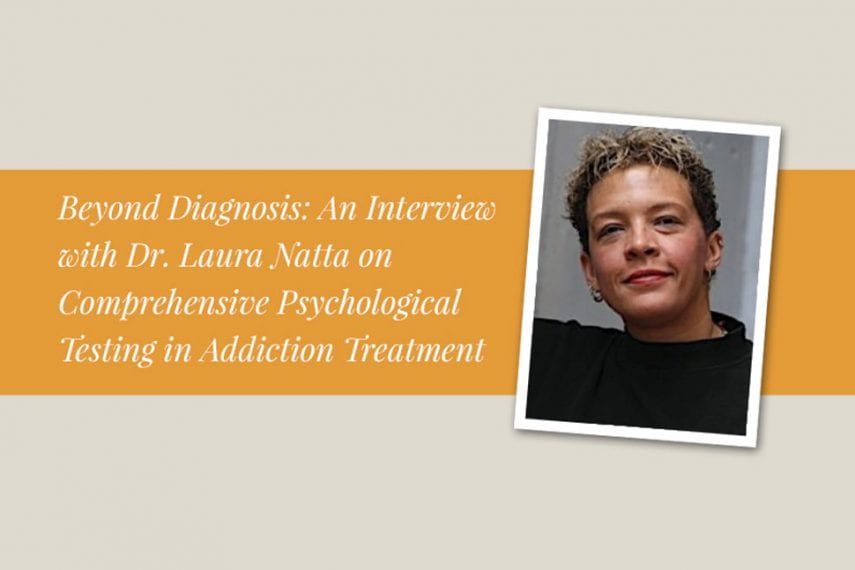Beyond Diagnosis: An Interview with Dr. Laura Natta on Comprehensive Psychological Testing in Addiction Treatment

Your journey to recovery is deeply shaped by the health care professionals to whom you entrust your care during a vulnerable time. The unique outlook of each clinician can affect not only the course of treatment, but also how you come to understand and relate to yourself. Recently I spoke with Dr. Laura Natta, Ph.D., about her own clinical approach and how her holistic, therapeutic assessment approach acts as an integral part of Alta Mira’s Comprehensive Diagnostic Assessment Program.
Dr. Laura Natta is the Director of Neuropsychological Assessment at Alta Mira, and is responsible for designing individualized assessment protocols for all of its clients. She earned her Ph.D. in Clinical Psychology from the Pacific Graduate School of Psychology at Palo Alto University, specializing in Clinical Neuropsychology. For over 15 years, she has worked with people living with addiction issues in a variety of settings and has created an innovative diagnostic practice that goes beyond standardized testing, to provide profound insight and truly personalized care.
The Process and Purpose of Neuropsychological and Psychological Testing
Neuropsychological and psychological testing are paramount to gaining a clear picture of each person’s needs and designing the best treatment program to optimize your chances of successful recovery. Assessment is not done by a single test, but draws on a variety of evidence-based tools designed to evaluate your emotional, cognitive, and behavioral features. For example, personality tests often use a series of questions and ask for true or false answers to measure traits such as interpersonal sensitivity, openness to change, and emotional stability, and can identify and categorize personality dysfunctions. Mood inventories ask you to rate the frequency and intensity of various emotional and behavioral symptoms to determine the presence and severity of mood disorders. Cognitive tests measure language, attention, memory, processing speed, visual-spatial ability, and executive functioning. The testing process can uncover vital information that standard self-reporting cannot to create a kind of tapestry telling your story, illuminating the relationship between your psychological state and your substance use, and allowing for accurate diagnosis of mental health disorders. The assessments identify not only areas of struggle, but also strengths, and allow both you and your clinicians to fully understand your unique situation.
After a clinical interview with Dr. Natta, she selects the best neuropsychological, mood, and personality tests for each individual based on their life circumstances, symptoms, and the specific concerns they express:
Unlike most other facilities, we use a flexible battery. We design each testing session specifically for the client, as opposed to using a set battery of tests for everybody. We also ask the client what issues are important to them. For people over 50, there are often concerns about memory. With younger people, it’s often achievement or IQ related–they don’t know why they haven’t yet been able to achieve the life they wish to have.
We're Here to Help. Call Today!
866-922-1350Implementing Optimal Testing Practices
- The assessment protocols themselves are thoughtfully designed to produce the most useful and relevant results.
- Most of the testing begins after you have completed medically supervised detox, to avoid the assessment process being tainted by substance use, and is staggered so the tests most sensitive to substances are conducted last.
- Testing continues throughout your stay, but informs treatment with the very first test, by giving clinicians the insight to customize therapeutic modalities to best support your healing.
- Assessments can also determine whether or not you are a candidate for psychopharmaceutical intervention and guide our psychiatrists to create effective and well-tolerated medication plans.
The objective nature of testing allows for the establishment of accurate diagnosis and careful conceptualization without clinician bias and client subjectivity. Dr. Natta explains, “Research shows that your clinical judgment is just about as good as chance. You have to do objective testing. For example, something can look like depression, but on testing they don’t say they are sad. Instead, it’s huge, paralyzing anxiety.” In other words, a person’s presentation may suggest a specific diagnosis, but rigorous testing can reveal a very different picture. Social withdrawal, lack of motivation, or disintegration of self-care may lead a clinician to assume that a patient is depressed, but if that patient scores very low on the a depression inventory and high on a trauma inventory, the clinician can quickly determine the true cause of their distress, and implement a treatment plan that addresses the unique needs of people whose reaction to trauma influences their addiction.
The sophisticated selection and administration of assessment can be particularly useful for people who enter treatment with multiple, sometimes conflicting, diagnoses:
Some people come in with 10-15 diagnoses. I start from scratch. It’s an honor to be able to sit with them and test them and get all their information and say ‘this fits.’ It’s like the CSI of psychology. You have to go with what the tests say instead of what you as the clinician ‘thinks it might be.’ It’s very humanizing; I’ve got to put my opinions aside and go with what the tests say.
Comprehensive Treatment for Substance Abuse with Co-Occurring Mental Health Disorders
For those with a co-occurring mental health disorder, psychological testing plays a critical role in ensuring comprehensive care. Without accurate identification of the co-occurring psychological disorder, you receive only partial treatment and are at heightened risk of relapse and ongoing emotional suffering:
Often in addiction treatment, the diagnosis that’s not a substance abuse diagnosis is left by the wayside, so people come out getting good addiction treatment, but they’ve never treated the other diagnosis. When they go home and they still have an underlying psychiatric diagnosis, their recovery is compromised. An appropriate diagnosis helps them get the complete treatment they need. We see quite a few people with very serious concurrent diagnoses.
Dr. Natta ensures that co-occurring mental health disorders are identified and addressed as an integral part of treatment at Alta Mira. Early engagement in therapies addressing the full scope of your needs empowers you to make the emotional and behavioral changes necessary to both break your addiction and heal your distress. By understanding the complex relationship between your substance use and psychological distress, you can disrupt the cycle and make meaningful progress toward true recovery.
Begin Your Recovery Journey Today
866-922-1350Conceptualizing The Whole Person
Of course, tests are not enough to form a complete picture of a person’s nuanced experience and a diagnostic label cannot begin to encapsulate the richness of a person’s life. Dr. Natta recognizes the need for the human element and sees the goal of the assessment process not as diagnosis, but conceptualization, creating a full, nuanced, and accurate picture of each individual:
We take time and we take care in figuring out the whole person. I’m going for total conceptualization more than diagnosis. People are too complex to stick in a particular category. You need more than just diagnosis–you need conceptualization.
After testing is complete, the entire interdisciplinary treatment team has a feedback session to discuss the results of the testing and conceptualization with the client to help them gain a greater understanding of themselves and their treatment needs. The testing process and feedback session can generate profound insights within the individual, as they begin to uncover previously unexplored emotional territory and gather vital insight into themselves. “I’m surprised by how much of what happens in testing mirrors what happens in the patient’s life. Sharing the results with them can be very powerful.”
By combining the latest evidence-based assessment with compassion, experience, and support, Dr. Natta goes beyond standardized testing and offers assessment as a therapeutic experience. Assessment can provide critical information into your psychological makeup and the driving forces behind your substance abuse, allowing for the development of effective treatment plans to help you reach your goals. At the same time, you are not just a diagnosis, and it is critical that clinicians offer more than a label. Dr. Natta ensures that each patient is fully recognized as a multidimensional being and offers real, relevant pathways toward sobriety and emotional harmony.
“Huge positive changes happen here.”
Learn more about Dr. Natta’s work by viewing one of her recent presentations:
At Alta Mira, compassionate professionals provide comprehensive assessment and treatment, to help get you on the road to recovery. Please reach out to us today.






